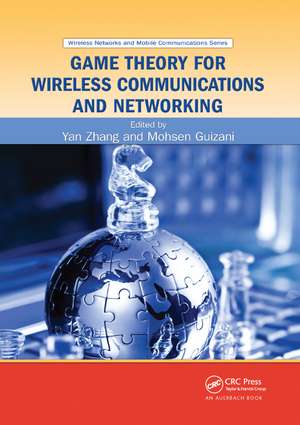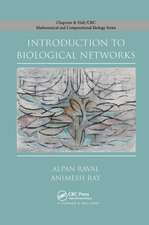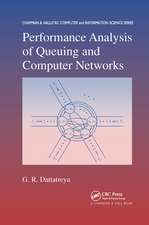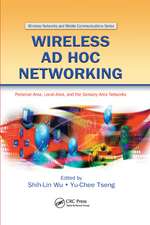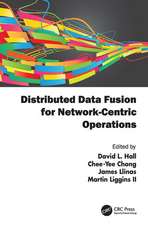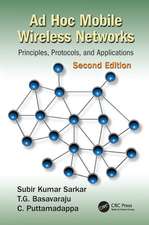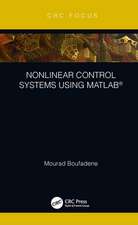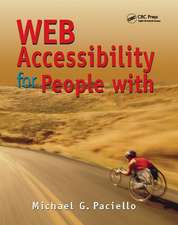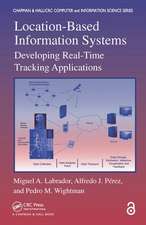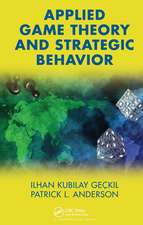Game Theory for Wireless Communications and Networking
Editat de Yan Zhang, MOHSEN GUIZANIen Limba Engleză Paperback – 23 sep 2019
This comprehensive technical guide explains game theory basics, architectures, protocols, security, models, open research issues, and cutting-edge advances and applications. It describes how to employ game theory in infrastructure-based wireless networks and multihop networks to reduce power consumption—while improving system capacity, decreasing packet loss, and enhancing network resilience. Providing for complete cross-referencing, the text is organized into four parts:
- Fundamentals—introduces the fundamental issues and solutions in applying different games in different wireless domains, including wireless sensor networks, vehicular networks, and OFDM-based wireless systems
- Power Control Games—considers issues and solutions in power control games
- Economic Approaches—reviews applications of different economic approaches, including bargaining and auction-based approaches
- Resource Management—explores how to use the game theoretic approach to address radio resource management issues
The book explains how to apply the game theoretic model to address specific issues, including resource allocation, congestion control, attacks, routing, energy management, packet forwarding, and MAC. Facilitating quick and easy reference to related optimization and algorithm methodologies, it supplies you with the background and tools required to use game theory to drive the improvement and development
| Toate formatele și edițiile | Preț | Express |
|---|---|---|
| Paperback (1) | 499.71 lei 6-8 săpt. | |
| CRC Press – 23 sep 2019 | 499.71 lei 6-8 săpt. | |
| Hardback (1) | 1014.75 lei 6-8 săpt. | |
| CRC Press – 23 iun 2011 | 1014.75 lei 6-8 săpt. |
Preț: 499.71 lei
Preț vechi: 624.63 lei
-20% Nou
Puncte Express: 750
Preț estimativ în valută:
95.63€ • 99.47$ • 78.95£
95.63€ • 99.47$ • 78.95£
Carte tipărită la comandă
Livrare economică 14-28 aprilie
Preluare comenzi: 021 569.72.76
Specificații
ISBN-13: 9780367382599
ISBN-10: 0367382598
Pagini: 588
Dimensiuni: 178 x 254 x 30 mm
Greutate: 1.11 kg
Ediția:1
Editura: CRC Press
Colecția CRC Press
ISBN-10: 0367382598
Pagini: 588
Dimensiuni: 178 x 254 x 30 mm
Greutate: 1.11 kg
Ediția:1
Editura: CRC Press
Colecția CRC Press
Public țintă
Academic and Professional Practice & DevelopmentCuprins
FUNDAMENTALS. Game Theory in Multiuser Wireless Communications. Decision Theory with its Applications in Wireless Communication. Game Theory in Wireless Sensor Networks. Game-Theoretic Models for Vehicular Networks. EGT in Wireless Communications and Networking. Game Theory for OFDM Systems with Incomplete Information. POWER CONTROL GAMES. Shannon Rate-Efficient Power Allocation Games. Noncooperative Power Control in CDMA Wireless Networks. Hierarchical Power Allocation Games. Dynamical Transmission Control. ECONOMIC APPROACHES. Auction-Based Resource Management and Fairness Issues in Wireless Networks. Cooperation Incentives in 4G Networks. Dynamics of Coalition Games for Cooperation in Wireless Networks. Auction Algorithms for Dynamic Spectrum Access. Bargaining Strategies for Camera Selection in a Video Network. Game-Theoretic Radio Resource Management in OFDMA-Based Cognitive Radio. Noncooperative Resource Management in Wireless Systems. Multistage Congestion Games for Wireless Real-time Streaming. Admission Control in IEEE 802.11e Wireless LAN: A Game-Theoretical Approach. Intelligent Network Selection: Game-Theoretic Approaches. Network Selection and Handoff in Wireless Networks: A Game Theoretic Approach.
Notă biografică
Yan Zhang is currently heading the Wireless Networks research group at Simula Research Laboratory, Norway. He is also an adjunct associate professor in the Department of Informatics, at the University of Oslo, Norway. He received his PhD from the School of Electrical and Electronics Engineering, Nanyang Technological University, Singapore. From August 2006, he has been with Simula Research Laboratory, Norway (http://www.simula.no/).
Zhang is an associate editor and serves on the editorial board of the International Journal of Communication Systems (IJCS—Wiley), Wireless Communications and Mobile Computing (WCMC—Wiley), and Security and Communication Networks (Wiley). He is currently serving as the book series editor for the book series on Wireless Networks and Mobile Communications (Auerbach Publications, CRC Press, Taylor & Francis Group). He also serves as a guest coeditor for the Wiley WCMC special issue for best papers in the conference IWCMC 2009; ACM/Springer Multimedia Systems Journal special issue on Wireless Multimedia Transmission Technology and Application; Springer Journal of Wireless Personal Communications special issue on Cognitive Radio Networks and Communications; Interscience International Journal of Autonomous and Adaptive Communications Systems (IJAACS) special issue on Ubiquitous/Pervasive Services and Applications; EURASIP Journal on Wireless Communications and Networking (JWCN) special issue on Broadband Wireless Access; IEEE Intelligent Systems special issue on Context-Aware Middleware and Intelligent Agents for Smart Environments; and Wiley Security and Communication Networks special issue on Secure Multimedia Communication. He is also a guest coeditor for Elsevier Computer Communications special issue on Adaptive Multicarrier Co
Zhang is an associate editor and serves on the editorial board of the International Journal of Communication Systems (IJCS—Wiley), Wireless Communications and Mobile Computing (WCMC—Wiley), and Security and Communication Networks (Wiley). He is currently serving as the book series editor for the book series on Wireless Networks and Mobile Communications (Auerbach Publications, CRC Press, Taylor & Francis Group). He also serves as a guest coeditor for the Wiley WCMC special issue for best papers in the conference IWCMC 2009; ACM/Springer Multimedia Systems Journal special issue on Wireless Multimedia Transmission Technology and Application; Springer Journal of Wireless Personal Communications special issue on Cognitive Radio Networks and Communications; Interscience International Journal of Autonomous and Adaptive Communications Systems (IJAACS) special issue on Ubiquitous/Pervasive Services and Applications; EURASIP Journal on Wireless Communications and Networking (JWCN) special issue on Broadband Wireless Access; IEEE Intelligent Systems special issue on Context-Aware Middleware and Intelligent Agents for Smart Environments; and Wiley Security and Communication Networks special issue on Secure Multimedia Communication. He is also a guest coeditor for Elsevier Computer Communications special issue on Adaptive Multicarrier Co
Descriere
This comprehensive technical guide explains game theory basics, architectures, protocols, security, models, open research issues, and cutting-edge advances and applications. Describing how to employ game theory in infrastructure-based wireless networks and multihop networks to reduce power consumption, it facilitates quick and easy reference to related optimization and algorithm methodologies. The book explains how to apply the game theoretic model to address resource allocation, congestion control, attacks, routing, energy management, packet forwarding, and MAC.
